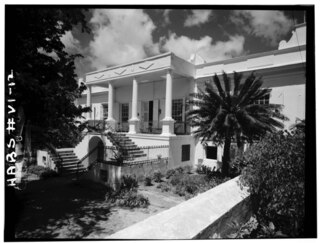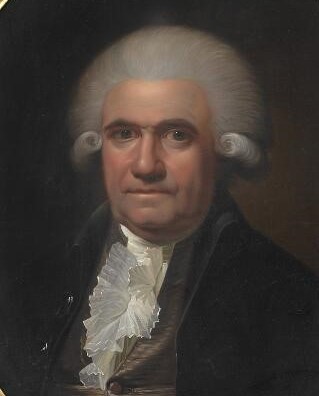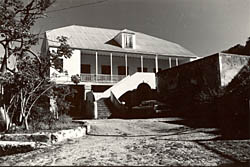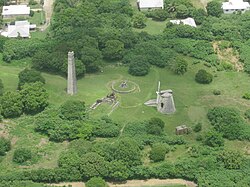
The Danish West Indies or Danish Virgin Islands or Danish Antilles were a Danish colony in the Caribbean, consisting of the islands of Saint Thomas with 83 square kilometres (32 sq mi); Saint John with 49 square kilometres (19 sq mi); and Saint Croix with 220 square kilometres (85 sq mi). The islands have belonged to the United States as the Virgin Islands since they were purchased in 1917. Water Island was part of the Danish West Indies until 1905, when the Danish state sold it to the East Asiatic Company, a private shipping company.

Cinnamon Bay is a body of water and a beach on St. John island, within Virgin Islands National Park, in the United States Virgin Islands.

Catherineberg Sugar Mill Ruins is an historic site located in the Virgin Islands National Park, east of Cruz Bay on Saint John, U.S. Virgin Islands. The ruins are an example of an 18th-century sugar and rum factory.

Cinnamon Bay Plantation is an approximately 300-acre (1.2 km2) property situated on the north central coast of Saint John in the United States Virgin Islands adjacent to Cinnamon Bay. The land, part of Virgin Islands National Park, was added to the United States National Register of Historic Places on July 11, 1978. Archaeological excavations of the land document ceremonial activity of the Taínos, as well as historic remains of plantation ruins.

Reef Bay Sugar Factory Historic District is a historic section of Saint John, United States Virgin Islands located on the south central coast adjacent to Reef Bay. The land is the site of a sugar factory. The property was added to the U.S. National Register of Historic Places on July 23, 1981.

Estate Catherineberg is a historic mansion on Denmark Hill in Charlotte Amalie, on Saint Thomas island, in the territory of the United States Virgin Islands.

Sugar production in the Danish West Indies, now the United States Virgin Islands, was an important part of the economy of the islands for over two hundred years. Long before the islands became part of the United States in 1917, the islands, in particular the island of Saint Croix, was exploited by the Danish from the early 18th century, and by 1800 over 30,000 acres were under cultivation, earning Saint Croix a reputation as the "Garden of the West Indies". Since the closing of the last sugar factory on Saint Croix in 1966, the industry has become only a memory.
Grove Place is a settlement on the island of Saint Croix in the United States Virgin Islands. It was added to the National Register of Historic Places in 1978.
Hogensborg is a settlement on the island of Saint Croix in the United States Virgin Islands.

La Grange is a settlement on the island of Saint Croix in the United States Virgin Islands.
Montpellier is a settlement on the island of Saint Croix in the United States Virgin Islands.
Peters Rest is a settlement on the island of Saint Croix in the United States Virgin Islands. The settlement originally formed around a sugar plantation.
Sion Hill is a settlement on the island of Saint Croix, in the United States Virgin Islands.

U.S. Virgin Islands Governor's Mansion may refer to any one of the three official residences owned by the government of the U.S. Virgin Islands and provided to the Governor of the United States Virgin Islands. One residence is located on each of the three largest inhabited islands of this U.S. territory in the Caribbean. The U.S. Virgin Islands maintains more official gubernatorial residences than any other state or territory of the United States.

The Estate Carolina Sugar Plantation near Coral Bay on Saint John, U.S. Virgin Islands is a historic sugar plantation and later rum distillery.

Whim is a historic sugar plantation located in Southwest subdistrict about 1.7 miles (2.7 km) southeast of Frederiksted on Centerline Road on Saint Croix, U.S. Virgin Islands. It was listed on the National Register of Historic Places in 1976. The listing included three contributing buildings, one contributing site, and two contributing structures, on 10 acres (4.0 ha).

Christopher MacEvoy Sr. was an Irish-born planter, landowner and merchant on St. Croix in the Danish West Indies. One of the largest landowners on the island, he moved to Europe in 1776, sharing his time between Denmark and England. He owned the country house Christiansholm in Klampenborg north of Copenhagen from c. 1777 to 1783. He was the father of Christopher MacEvoy Jr.
Christopher MacEvoy Jr. was a Danish merchant, landowner and planter. He was born in the Danish West Indies, where MacEvoy owned the Whim plantation, now a museum, on St. Croix. He later moved to Copenhagen where he established a trading house as well as a sugar refinery at Gammel Strand. He owned Bernstorff Palace in Charlottenlund from 1817 and the Dehn Mansion in Copenhagen from 1818.
Slob Historic District, near Christiansted, Virgin Islands, is a historic district which was listed on the National Register of Historic Places in 1987. The listing included nine contributing buildings, three contributing structures, and a contributing site on 9 acres (3.6 ha).

The property known as Estate Niesky was purchased in 1755 by the Moravian Church in Charlotte Amalie, during the era when America's original Thirteen Colonies were still part of the British Empire. The United States would not take possession of the islands until March 31, 1917, at which time Denmark sold the islands for the sum of $25,000,000 in United States gold coin.















